Overview
Philosophy
The philosophy of this Bachelor’s programme is hinged on the belief that in order to secure the world, attain peace, development and human rights, there is need to understand, explain and analyse the dynamics and meanings of global human interactions; the actors and the environment in which these interactions occur.
Rationale
To ensure a comprehensive scope and in-depth analysis regarding international issues.
Objectives:
- To explain key issues and trends in the development of International Studies.
- Discuss the theories and debates in international studies.
- Examine the multidisciplinary perspectives in diplomacy and International Studies.
- Apply the skills and knowledge learnt to provide solutions to international issues.
MODE OF DELIVERY
This programme shall use a blended learning approach of delivery of the programme involving both face to face mode and Open, Distance and E-Learning (ODel) Mode.
2.1. Face to Face- The methods of instruction shall be interactive and shall consist of lectures, class presentations, seminars, tutorials, case studies, fieldwork, practical sessions, student-teacher consultations, supervised independent study, group projects, guest speakers, or any combination of these.
2.2. Distance and E-Learning (ODeL) The Open, Distance and e-Learning Programme will include;
a. Multi-media approaches in distance education.
b. E-learning materials which will be provided on the online LMS for synchronous learning and will also be made available in external storage devices as back-up for asynchronous learning.
c. E-learning platform after conversion into e-format to provide collaborative learning through student-student, student-instructor and evaluation interaction.
d. A robust Learner Management System (LMS) and other e-learning Applications (Apps) downloadable on various electronic devices.
e. Limited face-to-face tuition during residential sessions.
f. Learner support services including academic and technical support shall be provided using multi-media approaches and during the limited face-to-face sessions.
Structure
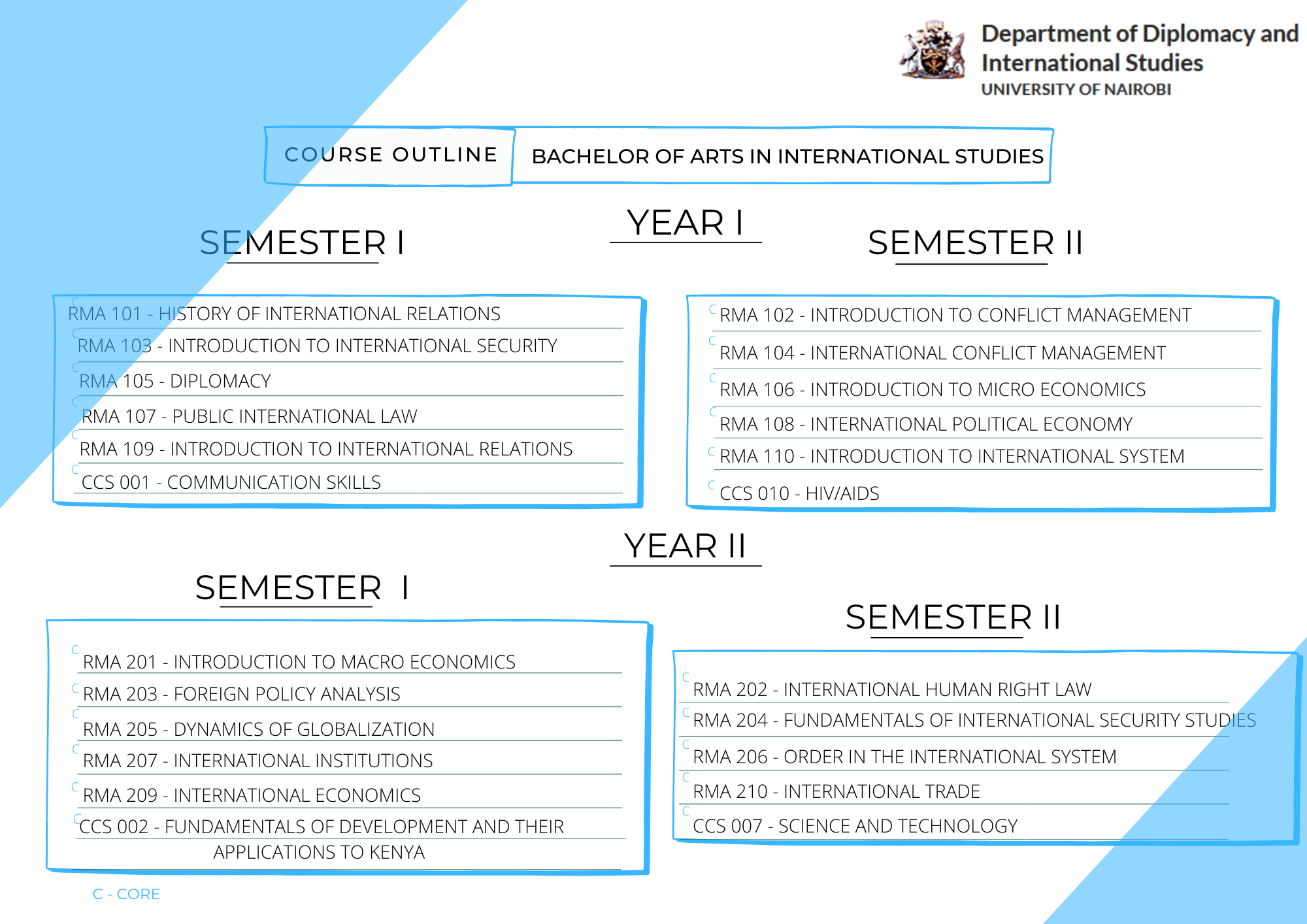
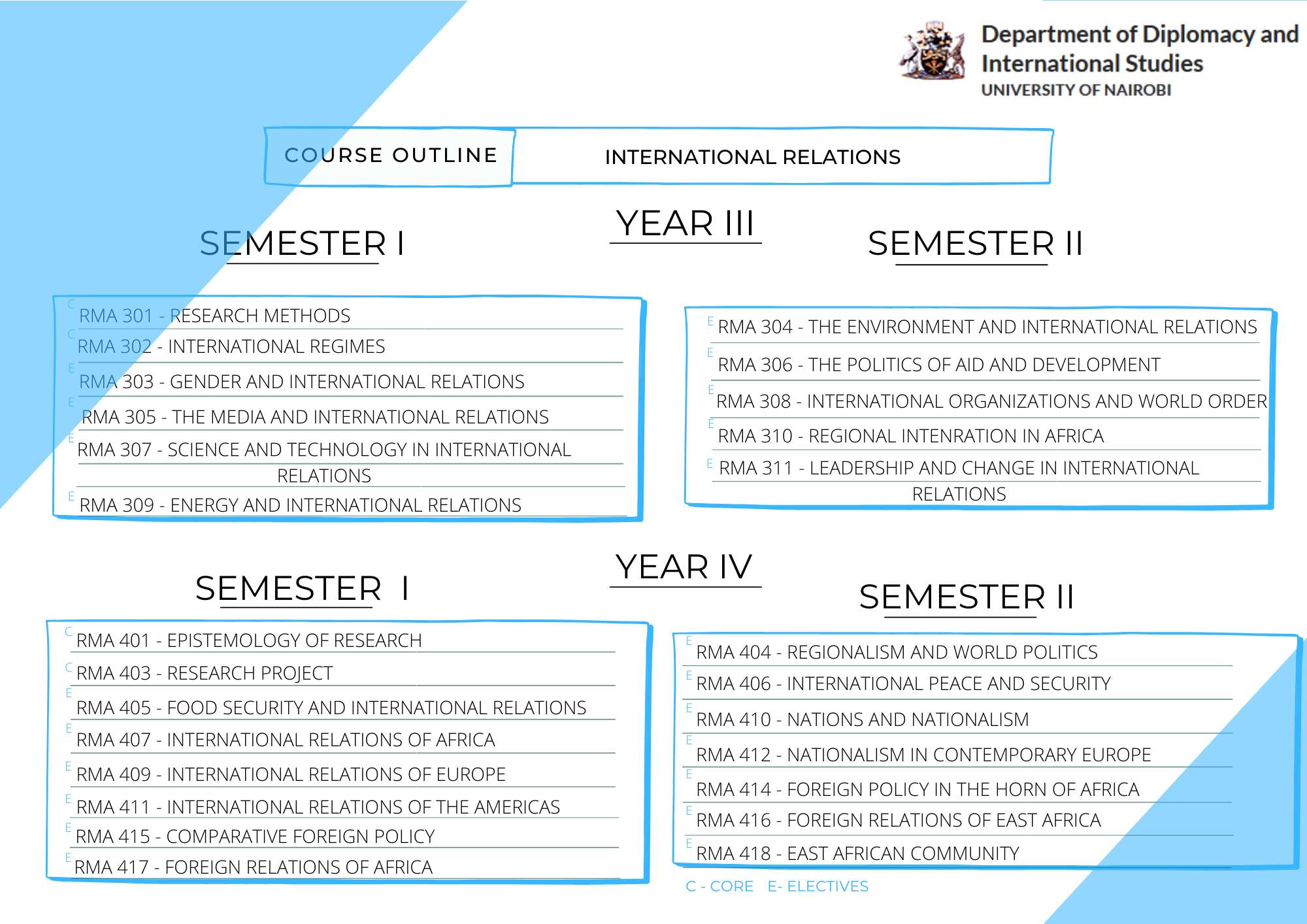
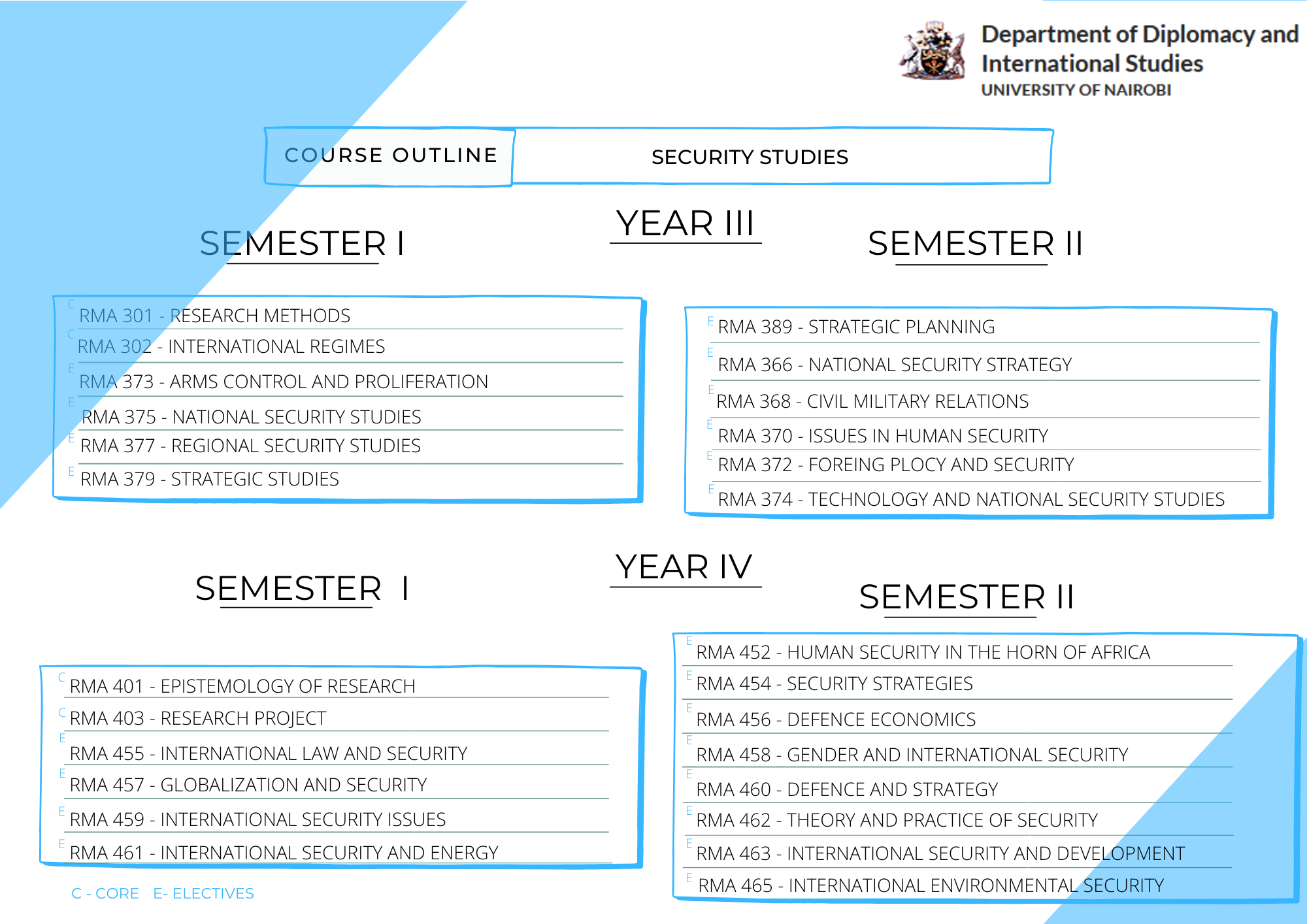
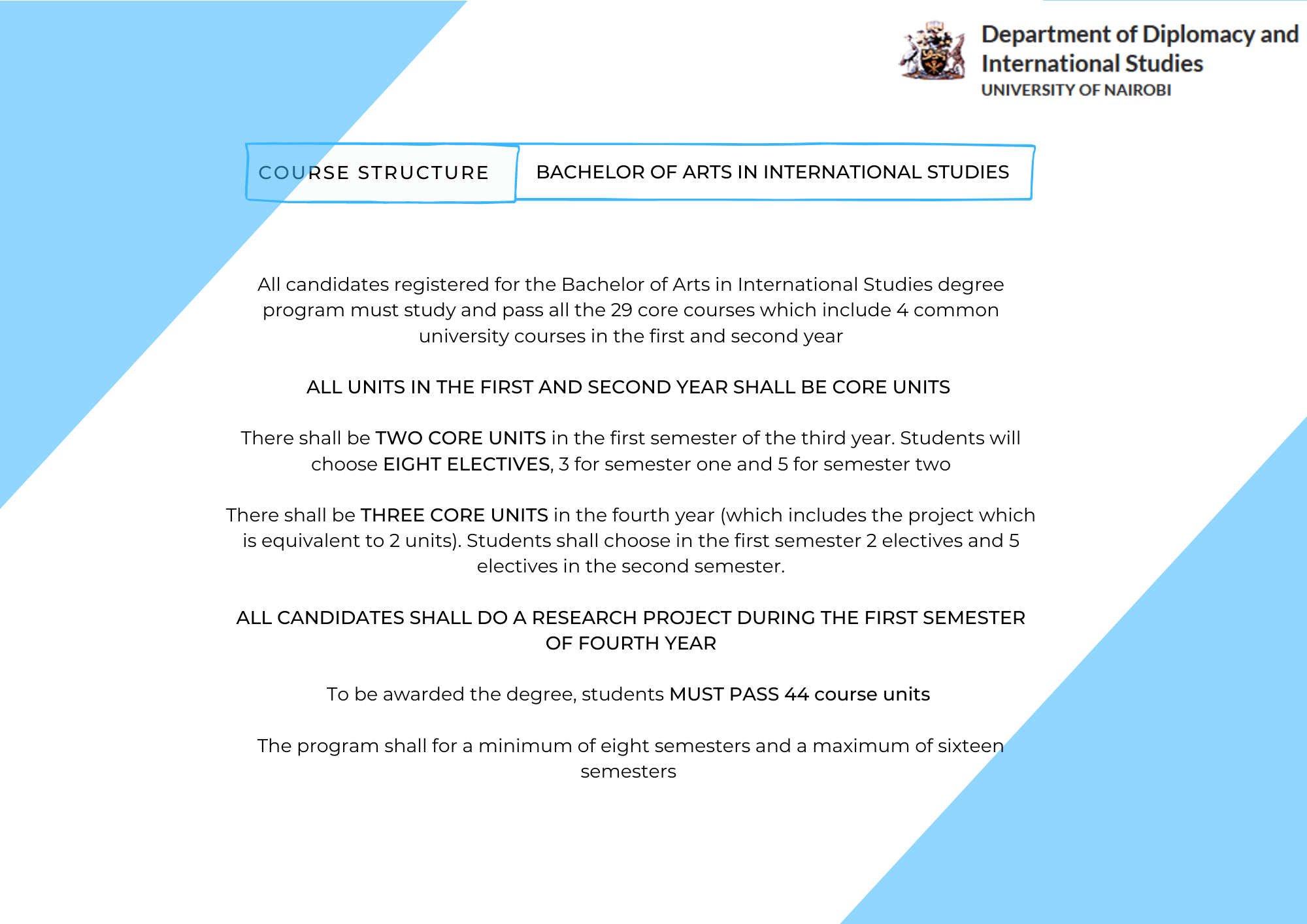
Admission Requirements
Admission requirements:
The Common regulations for the Bachelor of Arts degree in all the faculties of the University of Nairobi shall apply. The following shall be eligible for admission:
- Candidates must satisfy the minimum University entry requirements.
- Subject to regulation (a) above, eligible candidates for the Bachelor of Arts in International Studies shall have:
- KCSE with a mean grade of C+ and a minimum of C in English; or
- KCE Division Ill and a credit pass in English and a diploma from a recognized institution; or
- KCSE C plain with a minimum of C in English and a diploma from a recognized institution; or
- KCSE with C — with a minimum of C in English and a certificate and a diploma from a recognized institution; or
- “A” level certificate with at least two Principal Passes; or
- Holder of a degree from a recognized University or its equivalent
Credit Transfer and Exemptions
- The common regulations for credit transfer and exemptions of the University of Nairobi shall apply.
- A student shall be allowed to seek credit transfer or exemptions for up to one-third of the total taught courses units provided that they are equivalent to those offered by the University of Nairobi and were taken at equivalent level of study from an institution recognized by the University of Nairobi Senate.
- A student seeking credit transfer or exemptions shall send a formal application to the Academic Registrar through the Dean, Faculty of Social Sciences and the Chair of the Department, justifying the request, and attaching relevant supporting documents.
- Grades for transferred course units shall be entered in the student's transcript while the exempted course units shall be entered as 'exempt'.
- Credit transfers in case of students who are in exchange program shall be applicable only to specific Memoranda of Understanding or Agreements signed in advance between the University of Nairobi and the collaborating universities/institutions for joint programs.
Duration
Classes run during the evening hours only on a full time basis.
Intake occurs in January and September .
APPLICATION INFORMATION
To apply for the course you are interested in visit this link below for more information.
https://application.uonbi.ac.ke/
or
Contact of support person
Dr. Maluki Email. director-idis@uonbi.ac.ke
Careers
CAREER OPPORTUNITIES
Studying International Studies at the Department of Diplomacy and International Studies will prepare students for careers in various fields that include:
- Foreign service
- Diplomatic missions
- International Organizations e.g. United Nations, African Union, East African Community, World Bank etc.
- International Non-Governmental Organizations e.g. Human rights Watch, Amnesty International
- Government Security agencies
- International Humanitarian agencies e.g. International committee of the Red Cross.
- Educational Institutions: University teach and research
- Private sector: International Business.
INTERNSHIP OPPORTUNITIES:
Apart from using the university career office, our experienced academics staff will advice and guide our students on how to expose themselves by developing applicable skills and once the student identifies an internship opportunity, the Chair DDIS will provide a recommendation letter.
Fees and Funding
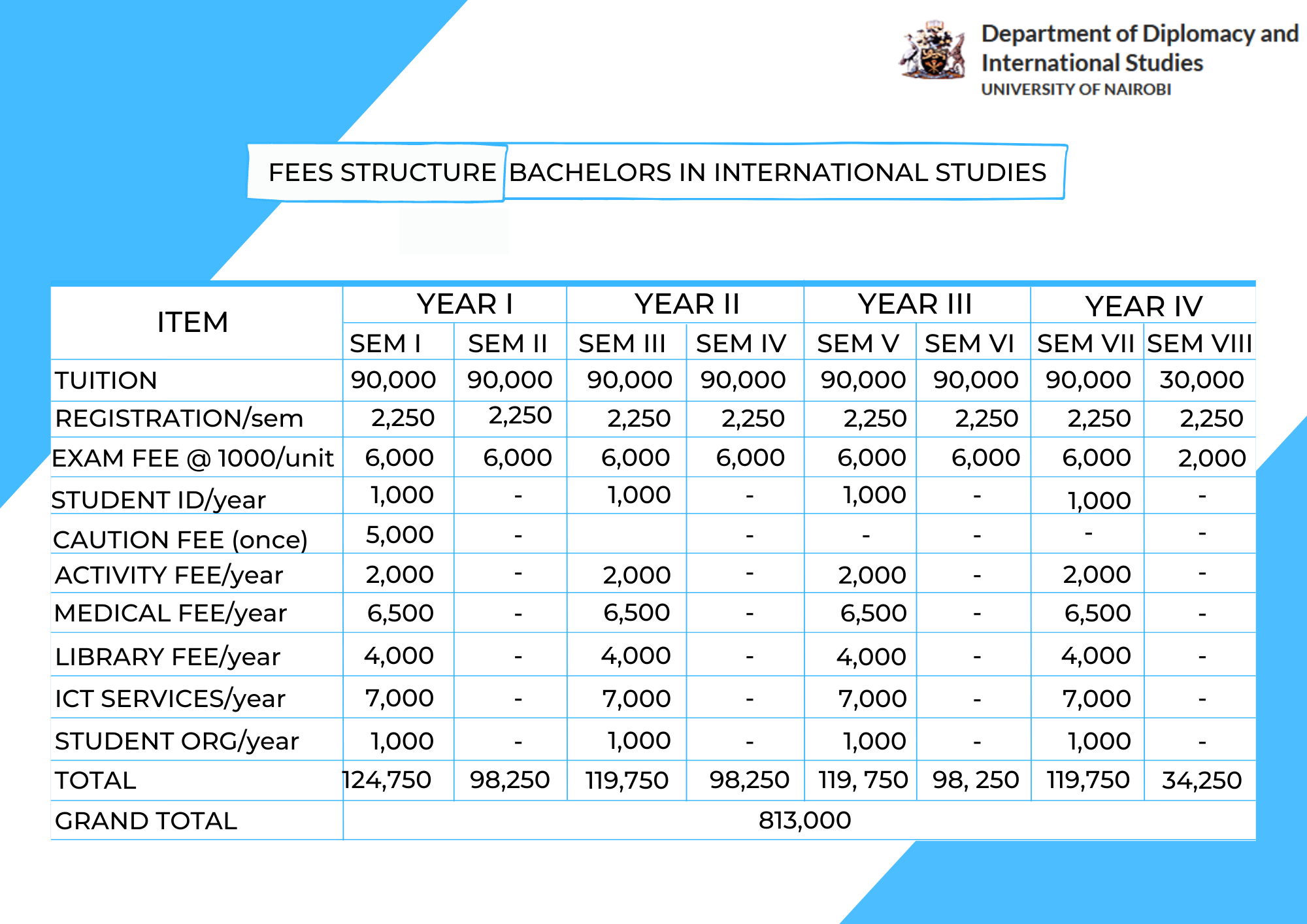
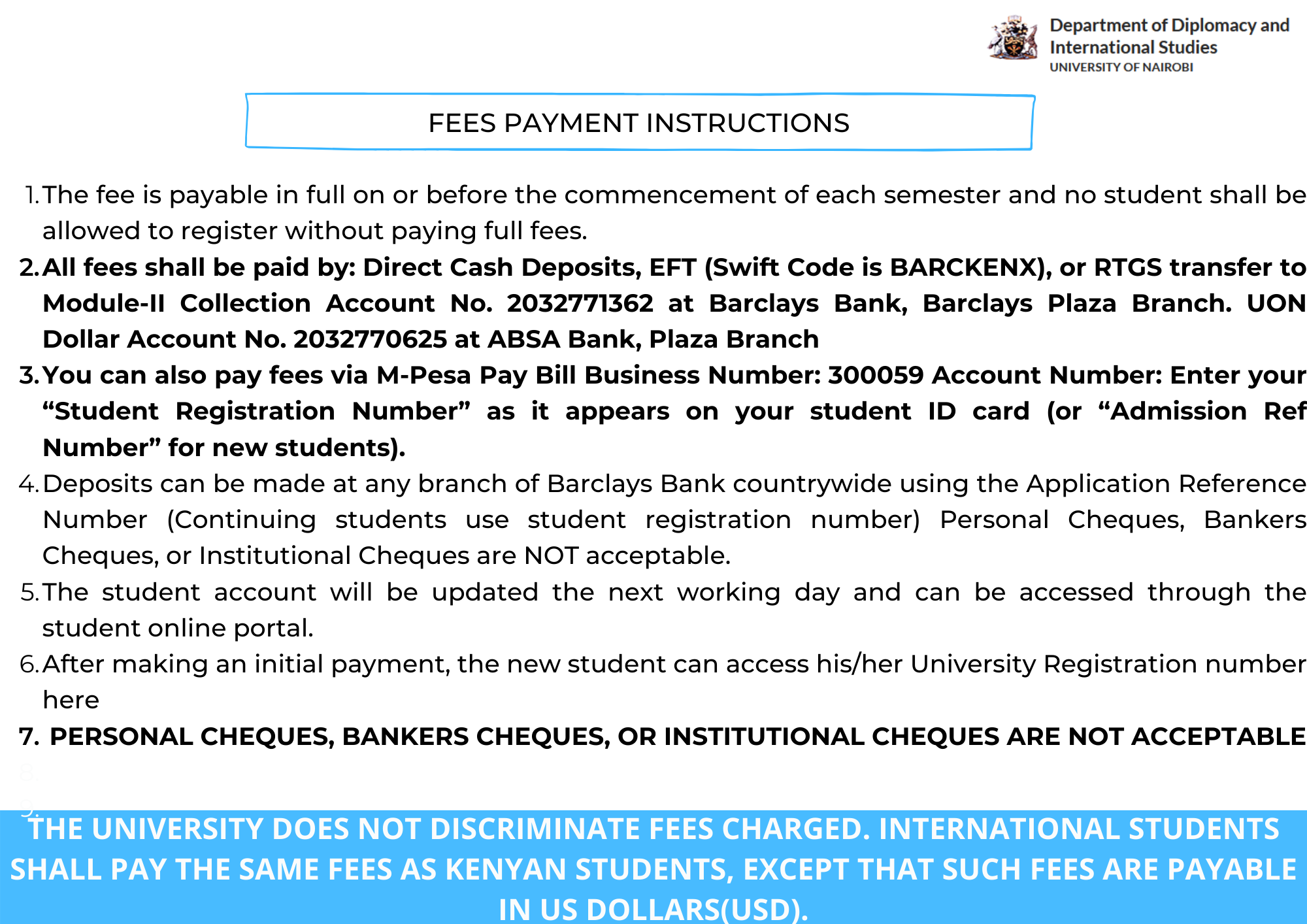
Exam Regulations
Exam Regulations
- The examination will be governed by the Senate approved examination regulations of the University of Nairobi for the time being in force
- For the award of the Bachelors in International Studies, a candidate will be required to pass in all the prescribed units taken
- Each course unit shall be examined by a two-hour written examination at the end of the semester during which the course was offered
- The written examinations shall constitute 70%
- Course work assessment shall comprise assignments and continuous assessment tests
- The pass mark shall be 40%
- A candidate who fails to satisfy the examiners in any unit with a mark between 31% and 39% may sit supplementary examinations in the failed course at the next regularly scheduled university examination sitting.
- A candidate who fails in the supplementary examinations shall be required to repeat the course
- A candidate who fails after repeating a course shall be discontinued
- The maximum score for supplementary examinations shall be 40%
- A candidate who fails with a mark of 30% or lower shall be discontinued
